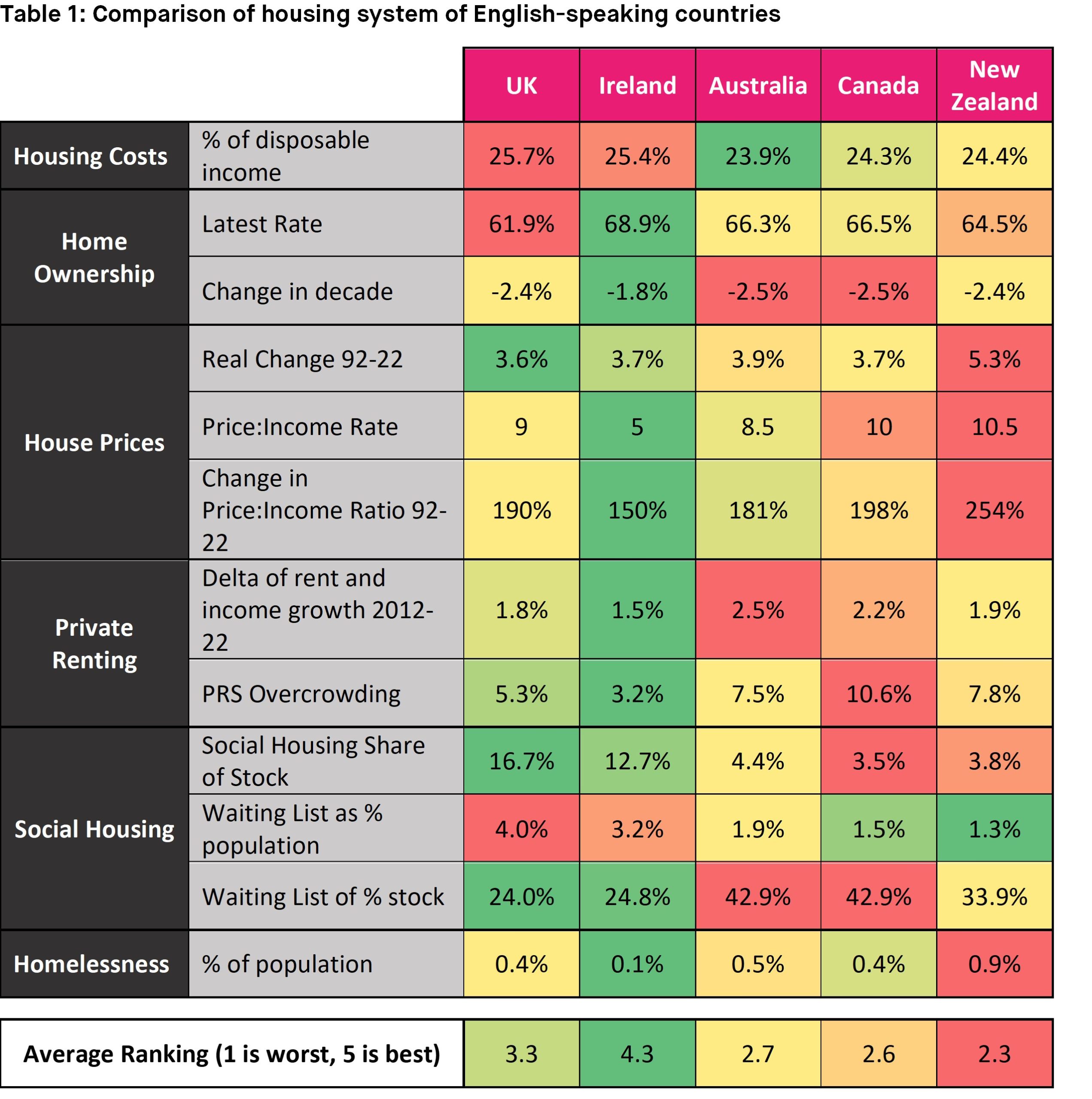Brits spend more on housing than their counterparts in New Zealand, Ireland, Australia and Canada – comparable countries that have similar housing crisis issues, Social Market Foundation think tank analysis finds.
In a report out today, launching a unique cross-national comparative study funded by the Nuffield Foundation, the Social Market Foundation (SMF) compares headline outcomes in the UK, with Australia, Canada, Ireland and New Zealand (‘the Anglosphere’). On certain key indicators such as proportion of disposable income spent of housing and proportion of population waiting for social housing – the UK is the worst performer. Brits spend nearly 26% of their disposable income on housing costs, compared to 24% in Australia and Canada.
However, overall, across the full range of metrics, the UK is middle of the pack, with an average ranking of 3.3 out of 5 (see table)

Source: SMF analysis
The SMF project comes at the time when housing has only become increasingly politically salient. The Conservative government aspired to 300,000 homes in England per year in its 2019 manifesto, and Sir Keir Starmer has set a target to build 1.5 million homes over five years, with rules to be tightened to ensure many of these are affordable.
On the social housing waiting list, level of homelessness, and general housing costs – the UK performs poorly both within the Anglosphere and more widely, the SMF finds. Over 1.2 million people are waiting for social housing in Britain – that’s 4% of the households. Not only are levels of homeownership lower than the SMF’s English-speaking comparators, they are also lower than most parts of Europe.
With each of the major parties sharpening their offers for a prospective election campaign, they would benefit from learning from the experience of politicians overseas, the SMF said. Looking internationally, although many of the challenges faced have been similar, policy approaches have been wildly different between countries. In this context, there is a lot for British politicians – currently developing their election manifestos – to learn from their counterparts abroad, the SMF said.
Across English-speaking countries, many have already taken and are taking different steps to address their housing problems. In Australia, the Housing Australia Future Fund will invest AUD $10bn in the stock market, and use the proceeds to fund affordable and social housing at a minimum of AUD $500m a year. In Ireland, housing is core to the Sinn Féin’s policy promises, and plans include cuts to rent and ending the selling off public land. In New Zealand, the current governing party won the recent election by campaigning against what it called the incumbent’s failed housing policies, including a ban on foreign buyers, planning reforms, public housing structures, and rental regulations.
In subsequent papers, the SMF will explore these different areas – planning reform, alternative ownership models, homeownership financial policies, and renter support policies – in turn, to examine if successes abroad can be replicated, and how failures may be avoided.
Aveek Bhattacharya, Interim Director of the Social Market Foundation, said:
“There is no doubting the hardship and frustration felt by British people locked out of the housing market. But our situation is not uniquely different to other English-speaking countries. The likes of Australia, New Zealand, Canada and Ireland face similar problems with expensive housing, homelessness, and falling home ownership rates. We perform worse than them on some metrics, but better on others.
That creates a valuable learning opportunity – to get to the roots of our common dysfunction and to learn how economies and societies facing similar challenges to ours are addressing them. That is why this new series, exploring lessons on planning reform, home ownership policies, alternative ownership models and support for renters from across the ‘Anglosphere’ is so needed and so timely.”
Dr Catherine Dennison, Programme Head at Nuffield Foundation, said:
“The next UK government will need to confront a long list of challenging issues on housing. The SMF’s analysis demonstrates that many potential policy solutions have been tried internationally, and there’s a lot to gain from learning from their experiences. The foundation is funding this project ahead of the general election, to ensure that political promises are grounded in robust evidence and subject to expert and voter scrutiny.”
Notes
- The SMF report, Dwelling on it, will be published at https://www.smf.co.uk/publications/dwelling-on-it-housing-crises/ on Wednesday 13th March
- The Nuffield Foundation is an independent charitable trust with a mission to advance social well-being. It funds research that informs social policy, primarily in Education, Welfare, and Justice. The Nuffield Foundation is the founder and co-funder of the Nuffield Council on Bioethics, the Ada Lovelace Institute and the Nuffield Family Justice Observatory. The Foundation has funded this project, but the views expressed are those of the authors and not necessarily the Foundation. Website: nuffieldfoundation.org Twitter: @NuffieldFound
Contact
- For media enquiries, please contact press@smf.co.uk
ENDS
